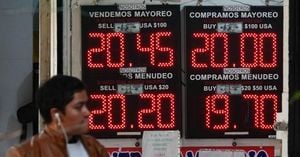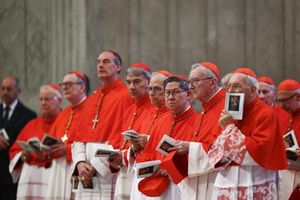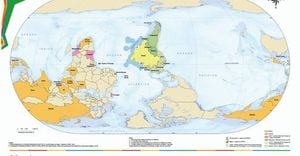South Korea is witnessing unprecedented political tensions as President Yoon Suk-yeol has stirred controversy by proposing martial law amid rising dissent and public unrest. With the nation closely observing the government’s every move, the proposition has been met with fierce backlash from opposition parties and civic groups who caution against the repercussions of such actions.
President Yoon's recent comments have raised eyebrows far and wide. During his speeches, he argued, “My decision stems from the need for order and protection of citizens” citing the need to stabilize the nation against what he perceives as increasing chaos. This declaration follows public demonstrations and growing political opposition challenging his administration’s policies.
The proposed martial law has thrown South Korea’s democratic integrity under scrutiny. Kim Sun-joo, leader of the Democratic Party, firmly stated, “Using martial law would be unthinkable and could severely harm democracy.” His remarks reflect concerns shared by many South Koreans who have long savored their hard-fought democratic freedoms. Activists have come out to voice their alarm, fearing the potential deterioration of civil liberties and human rights should martial law be enacted.
This tension has led to widespread apprehension among the general public. Many are wary of the memories of past authoritarian control, recalling the dark times during South Korea’s military dictatorships. Civic groups, previously unwavering supporters of democratic movements, have launched campaigns to rally citizens against the reemergence of martial law as they remind the public of historical abuses of power and the importance of preserving freedom.
The environment has become increasingly charged, with mass protests erupting across major cities, particularly Seoul. Citizens are expressing their frustrations and demanding accountability from their government. The specter of martial law hangs ominously over these public demonstrations, now fuelled by fear and distrust toward the administration.
President Yoon’s administration has defended its stance, arguing martial law is necessary to restore order and protect citizens from potential violence. Yoon asserts he is willing to utilize every tool at his disposal to guide the nation through these tumultuous times. His approach has been described by some as heavy-handed, leading analysts to question whether this divisive act could ignite more unrest rather than quell it.
This latest move for martial law occurs within a broader narrative of discontent with Yoon’s administration which has faced numerous challenges, including economic difficulties and disapproval over handling various crises. Observers postulate whether this could be seen as Yoon's last resort strategy to maintain control over his governing party, especially as his approval ratings have declined sharply.
The specter of military enactment looms not only over political circles but also raises concerns internationally. Other governments and international organizations are closely monitoring the situation, stressing the importance of upholding democracy. Diplomatic channels have been rife with discussions on the consequences South Korea may face should martial law take effect.
Public sentiment reflects both anxiety and confusion. While many citizens support Yoon’s need for order, others see martial law as antithetical to the very principles of freedom they cherish. This divide is symptomatic of the greater ideological schism within South Korean society today, which reflects various perspectives on governance, national identity, and democratic values.
Given the gravity of the situation, the coming days will be pivotal. Both President Yoon and his opponents are at crossroads, with reactions from the public potentially influencing political maneuvers moving forward. Political analysts predict more demonstrations and heightened debate as both sides prepare for the battle over the narrative of democracy versus security.
What's evident is the historic nature of these events. To predict how this saga will resolve itself is fraught with uncertainty. South Koreans are holding their breath, bracing for possible proclamations from President Yoon and the government as tensions escalate. With such deep rifts forming over the martial law discussion, the ramifications for the country could be far-reaching, impacting not only its political future but also its standing on the world stage.



